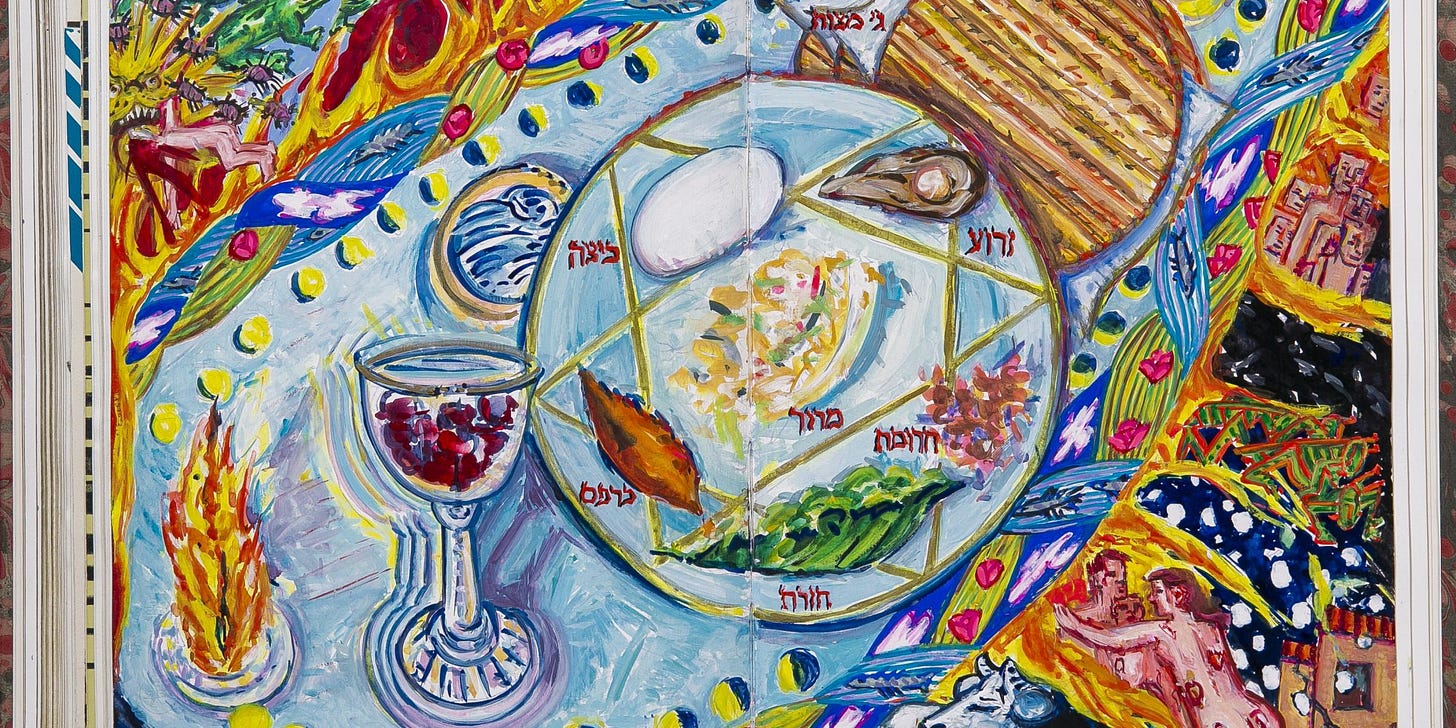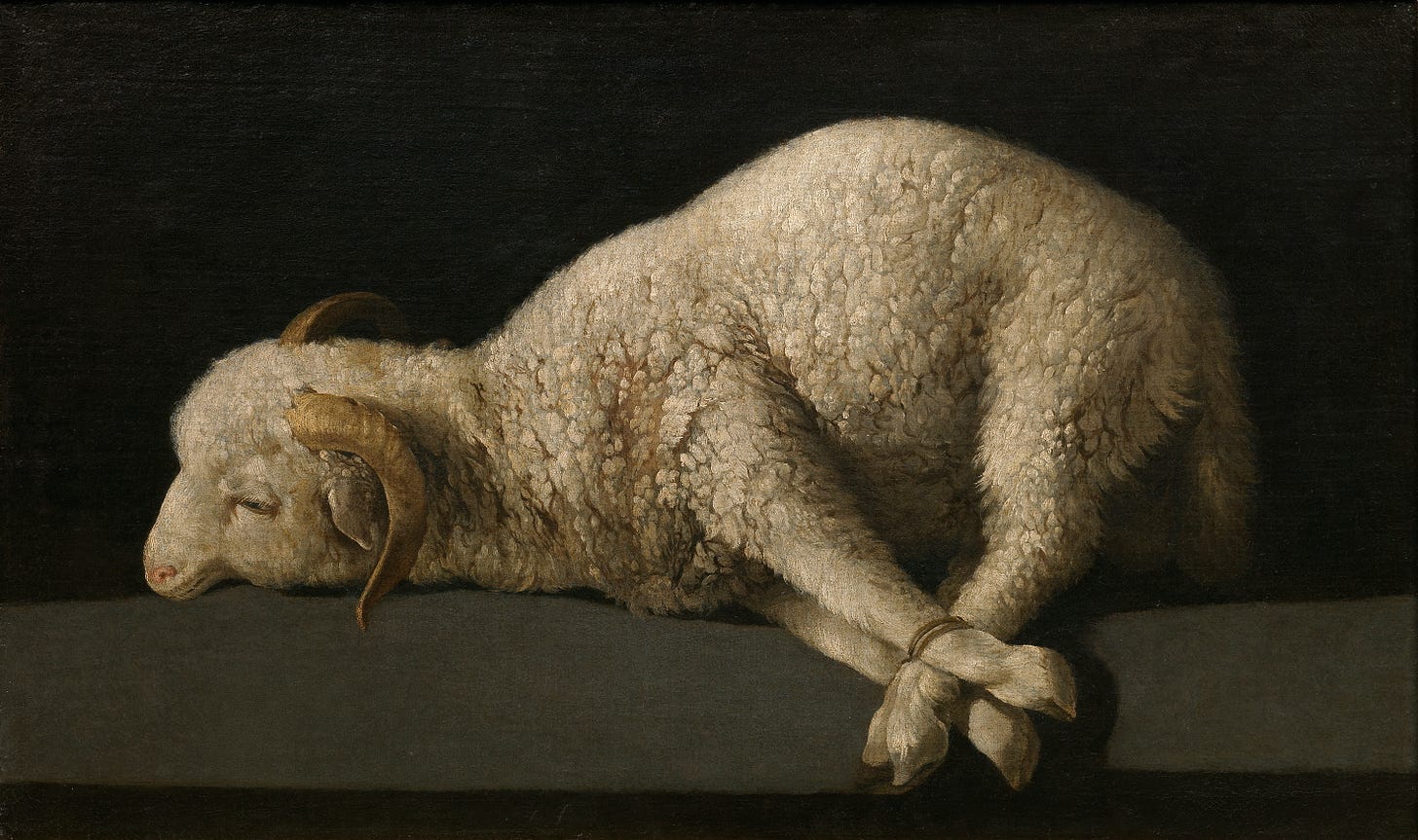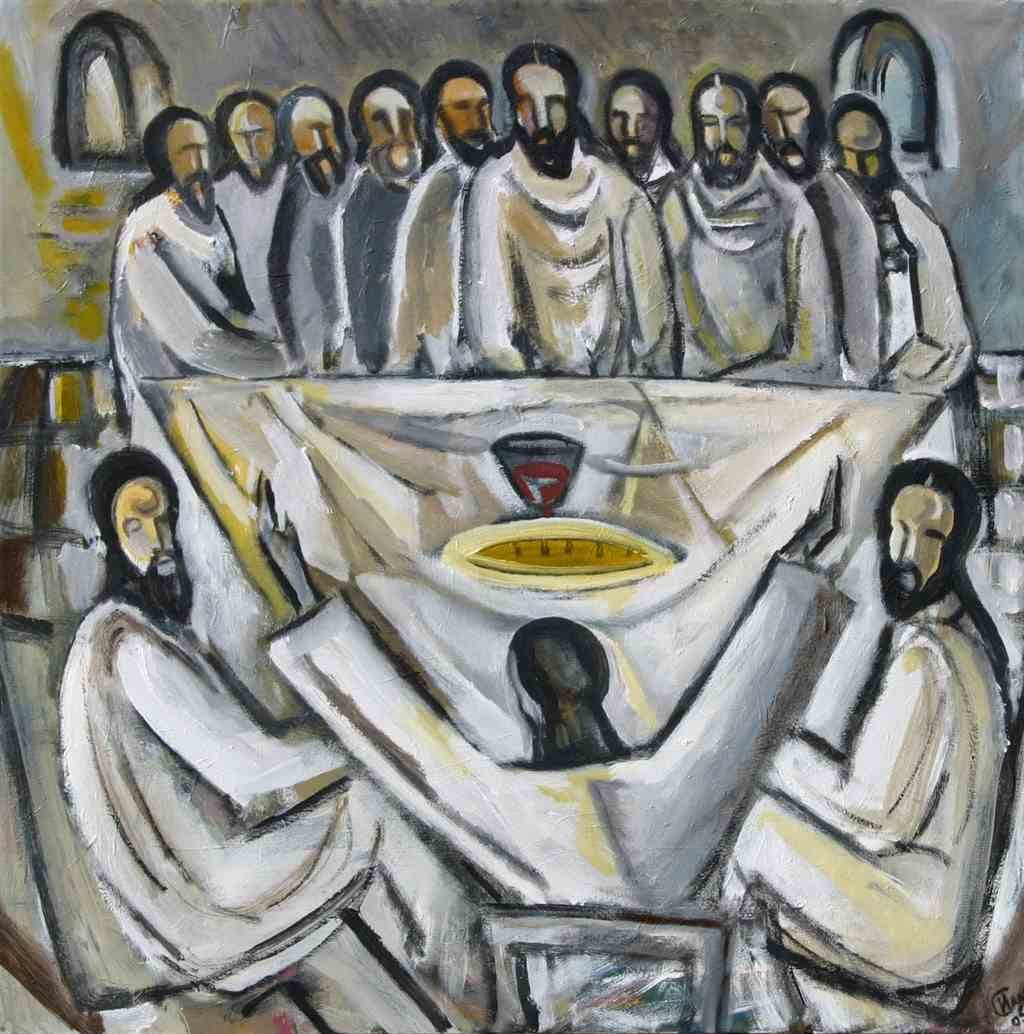Exodus 12:1-30
12 The Lord said to Moses and Aaron in Egypt, 2 “This month is to be for you the first month, the first month of your year. 3 Tell the whole community of Israel that on the tenth day of this month each man is to take a lamb t for his family, one for each household. 4 If any household is too small for a whole lamb, they must share one with their nearest neighbor, having taken into account the number of people there are. You are to determine the amount of lamb needed in accordance with what each person will eat. 5 The animals you choose must be year-old males with
out defect, and you may take them from the sheep or the goats. 6 Take care of them until the fourteenth day of the month, when all the members of the community of Israel must slaughter them at twilight. 7 Then they are to take some of the blood and put it on the sides and tops of the doorframes of the houses where they eat the lambs. 8 That same night they are to eat the meat roasted over the fire, along with bitter herbs, and bread made without yeast. 9 Do not eat the meat raw or boiled in water, but roast it over a fire—with the head, legs and internal organs. 10 Do not leave any of it till morning; if some is left till morning, you must burn it. 11 This is how you are to eat it: with your cloak tucked into your belt, your sandals on your feet and your staff in your hand. Eat it in haste; it is the Lord’s Passover.
12 “On that same night I will pass through Egypt and strike down every firstborn of both people and animals, and I will bring judgment on all the gods of Egypt. I am the Lord. 13 The blood will be a sign for you on the houses where you are, and when I see the blood, I will pass over you. No destructive plague will touch you when I strike Egypt.
14 “This is a day you are to commemorate; for the generations to come you shall celebrate it as a festival to the Lord—a lasting ordinance. 15 For seven days you are to eat bread made without yeast. On the first day remove the yeast from your houses, for whoever eats anything with yeast in it from the first day through the seventh must be cut off from Israel. 16 On the first day hold a sacred assembly, and another one on the seventh day. Do no work at all on these days, except to prepare food for everyone to eat; that is all you may do.
17 “Celebrate the Festival of Unleavened Bread, because it was on this very day that I brought your divisions out of Egypt. Celebrate this day as a lasting ordinance for the generations to come. 18 In the first month you are to eat bread made without yeast, from the evening of the fourteenth day until the evening of the twenty-first day. 19 For seven days no yeast is to be found in your houses. And anyone, whether foreigner or native-born, who eats anything with yeast in it must be cut off from the community of Israel. 20 Eat nothing made with yeast. Wherever you live, you must eat unleavened bread.”
21 Then Moses summoned all the elders of Israel and said to them, “Go at once and select the animals for your families and slaughter the Passover lamb. 22 Take a bunch of hyssop, dip it into the blood in the basin and put some of the blood on the top and on both sides of the doorframe. None of you shall go out of the door of your house until morning. 23 When the Lord goes through the land to strike down the Egyptians, he will see the blood on the top and sides of the doorframe and will pass over that doorway, and he will not permit the destroyer to enter your houses and strike you down.
24 “Obey these instructions as a lasting ordinance for you and your descendants.25 When you enter the land that the Lord will give you as he promised, observe this ceremony. 26 And when your children ask you, ‘What does this ceremony mean to you?’ 27 then tell them, ‘It is the Passover sacrifice to the Lord, who passed over the houses of the Israelites in Egypt and spared our homes when he struck down the Egyptians.’ ” Then the people bowed down and worshiped. 28 The Israelites did just what the Lord commanded Moses and Aaron.
29 At midnight the Lord struck down all the firstborn in Egypt, from the firstborn of Pharaoh, who sat on the throne, to the firstborn of the prisoner, who was in the dungeon, and the firstborn of all the livestock as well. 30 Pharaoh and all his officials and all the Egyptians got up during the night, and there was loud wailing in Egypt, for there was not a house without someone dead.
Passover is central to the Jewish calendar, the Jewish story, and the Jewish psyche. Much of its symbolism might be lost on us today, but it was central for Jesus and the Gospels.
Therefore, if we are to make sense of Jesus, his death, and the storied framework of our salvation, we need to understand Passover. We can achieve this by unfolding the three primary symbols at work: the bread, the blood, and the lamb. But first, let’s look at this festival with a wide-angle lens.
The evening of Passover occurred simultaneously with the tenth plague, the death of the firstborn, which comes as a shock to us. But God had warned Pharaoh at the outset, “Israel is my firstborn son… Let my son go so he may worship me! But you refused to let him go, so I will kill your firstborn son” (Ex. 4:23). Each of the previous plagues were chances for Pharaoh to change course. But at this point in the story, his heart is frozen over. God will now act alone, without the assistance of Moses or Aaron, to cut off Pharaoh’s line of ‘divine’ kingship.
As you read the following chapters (especially Ex. 13), you will see much talk about firstborns. As you read the laws of Torah, firstborns are a big deal. They are a stand-in, a representative, for the entire family. All of whom belong to God. Passover, as we’ll see, is a visceral reminder that the firstborn, and everyone in the family, belongs to God. And everyone needs to be redeemed.
Onto the three symbols.
The Bread
Bread, often a stand-in for food more broadly, is what sustains. Simple enough. But why unleavened bread? Unleavened bread became a symbol of the haste with which this meal was eaten. Beginning this night of Passover, Israel will live as nomads, just like their ancestors, until they are settled within the land, ending a long Exodus. The way out is a long journey through a desert land.
The bread, therefore, is baked quickly, without yeast. And for the rest of the feast, any yeast is forbidden. This may be symbolic of the state of oppression under Pharaoh, prevented from being able to multiply and spread. Either way, yeast, as it was for Jesus, was symbolic of multiplying one’s qualities (thus the warning against the ‘yeast’ of the Pharisees, Matt. 16:6).
All in all, the unleavened bread was emblematic of the new mode of existence Israel would have until Yahweh set up his temple in Zion. Israel lived off manna, what the land provided, and every word that God gave them.
The Blood
Blood is life. Not just metaphorically. Yes, that is also true throughout the Hebrew Bible. But blood is our life. Innocent blood (life) is what covers the entrance to the home so that “the destroyer” would not enter. The scarlet streaks were a stark reminder of the first plague and the slaughter of the boys by Pharaoh that began the book. The blood is a sign. A sign that God will look to the life of a blameless representative instead of taking back the life of the firstborn. God will “pass over.”
But what does that mean?
Here is a puzzle. Unlike its common name, the Hebrew word pesah, doesn’t simply mean to ‘pass’ or skip over. It means to cover. Isaiah 31:5 uses it as a synonym for ‘shielding’ or ‘protecting’. It’s what Yahweh himself does. He stands at the entrance, in between destruction and the life inside. In other words, Yahweh identifies with the blood of the lamb.
As Passover continued to be celebrated by Israel, wine became a parallel symbol for the blood. However, unlike the blood, the wine becomes an ingested symbol of the life given in your place. As Passover tradition developed, there were four cups to commemorate the fourfold promise of God (Ex. 6:6-7).
The Lamb
The spotless lamb is a blameless representative for the firstborn sons of Israel. This lamb is how the sons of Israel are redeemed. There’s that too familiar word. But what does it mean? Redemption is all about obtaining back something that belongs to you. All of the sons belong to God. God has a claim on their lives. However, Pharaoh enslaved them. So God will redeem them from their slavery.
Moreover, God has a claim on all life. And he’s going to follow through with that claim. The only way one can be redeemed from slavery and death is by another life taking their place. God then gives the lamb as a placeholder. When the lambs are slaughtered, it reminds them that they were redeemed through the shedding of blood, a gift of God.
If you want to know more about the idea of redemption, Bible Project is currently doing a word study series on redemption. I can’t recommend it enough.
All together, the Passover marks a new beginning. The archaic calendar Israel used now resets, centering on the moment in history when Yahweh delivered them from slavery and death. This is Israel’s foundation story, their birth as a nation. More than any other festival in the Hebrew Bible, Passover defines the story of Israel.
With this in mind, we can now shift to how Jesus interpreted the Passover story in light of his suffering and death. From there, we can see what applications we can glean if you’ve stuck this far.
Jesus and Passover
When Jesus looked toward Jerusalem, he spoke of (lit.) his “exodus” that was going to be fulfilled (Lk. 9:31). And as tensions rose in his final confrontations with the temple leadership, Jesus seems to have intentionally chosen Passover weekend to accomplish his exodus. Knowing his arrest was at hand, it seems Jesus celebrated Passover with his disciples early, reinterpreting the meal in light of what would take place that very day (the Hebrew day begins at sundown).
On that note, some have noticed a strange discrepancy between the Synoptic Gospels (Matthew, Mark, Luke) and the Gospel of John. The Synoptics portray the Last Supper and the crucifixion as happening on Passover evening, while John describes the crucifixion happening before the Passover celebration, when the lambs were being selected for sacrifice. Instead of a conflicting account, John is working with a different chronological frame for the same events. In doing so, he is communicating that Jesus is “the Lamb of God who takes away the sins of the world” (Jn. 1:29). Meanwhile, the Synoptics are drawing on the Passover meal, the Last Supper, to show what the death of Jesus means. All the symbols now come together in the four Gospels. The bread, the blood, and the lamb.
What should be obvious now is that the Last Supper was not just some meal. The bread and cup were not just convenient symbols that Jesus hijacked for his own purposes. No. This meal already told a story, a story that pointed forward to a greater fulfillment, a greater exodus, a cosmic salvation story. Here, the bread, blood, and lamb, but also the firstborn, the bloodied wooden frame, the prophet, and God himself find fulfillment in one person. The Passover story, with its symbolism, its new beginning, collapses into the Messiah and his story.
To comprehend the death of Christ means for us, we are given a template. Passover, even more than the Day of Atonement, paints this picture for us. What then did the death of Jesus accomplish on that Passover day?
God gave Jesus as a ransom for us. That is, he took our place as a blameless representative. We deserved to be handed over to the powers of Sin and Death. But Jesus stood in our place to redeem us, to take ownership of us. He did this by shedding his blood, giving up his life, to cover over our sin. Therefore, we are freed to journey towards the full arrival of God’s kingdom as people who have passed through the waters of death, our baptism intoist.
Passover and The Lord’s Supper
To close, let’s apply this to our situation as Christians celebrating the Lord’s Supper.
The Lord’s Supper is not Passover. Nor is it simply ‘like’ Passover, an Old Testament callback. It is the fulfillment of and destination of the Passover meal. In it, we feast on the bread of life, the lamb of God, who shed his blood, forging the new covenant. We now have full communion with our God through the Son. And so we take this reality into our bodies.
In communicating the meaning of his death, Jesus didn’t give a theological explanation or sermon. He gave us a meal. The Lord’s Supper is a tangible reminder of the salvation accomplished by the death of the firstborn of all creation.
However, unlike Passover, it’s not just symbolic. When we partake in this meal, we are communing with the Father, in Christ, who draws us in by the Spirit. And the more we meditate on this reality, the more we can grow in our intimacy with God. But we can’t do this without understanding the Passover notes of the Communion feast.






